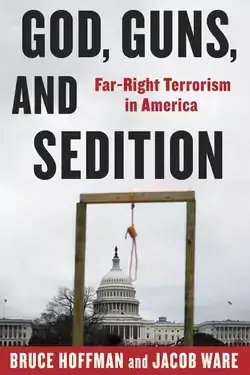Review by Angela King
God, Guns, and Sedition: Far-Right Terrorism in America (A Council on Foreign Relations book), authored by Bruce Hoffman and Jacob Ware, succinctly captures a picture of Violent Far-Right Extremism dating back at least four decades in America while concomitantly connecting significant far-right themes and activity in other countries. The book demonstrates that some of what is thought of as ‘new’ beliefs, tactics, and melding among groups in the violent far-right have been around for decades. Realities such as law enforcement and military personnel–both active duty and veterans–targeted for recruitment by the violent far-right, and themes touching on white supremacy, leaderless resistance, and accelerationism–none of which are new–permeate God, Guns, and Sedition: Far-Right Terrorism in America.
Of particular interest are the policy recommendations offered in God, Guns, and Sedition: Far-Right Terrorism in America. This read offers practitioners, government, and other imperative positions working in countering domestic terrorism and violent far-right extremism a plethora of suggestions and potential options working in tandem to ebb the flow of violent far-right extremism in America. The thorough list of recommendations takes a moderate approach, with sensitivity to the current state of politics.
The one point of want in this read is more discussion on the important role misogyny plays in the violent far-right, and for women, particularly. Violent far-right attitudes toward women run rampant among the divergent actors involved–both online and physically–harboring themes such as domestic violence, manipulation, and lasting trauma that remain intact for many women who were touched in some way by this violent belief system. While men consistently maintain the highest number of participants/participation within the violent far-right, the gendered dynamic begs for the same care and understanding other aspects of the violent far-right receive.
All told, God, Guns, and Sedition: Far-Right Terrorism in America offers one of the most comprehensive, succinctly told accounts of violent far-right extremism spanning the past four decades and up to contemporary representations in America. It offers new policy recommendations and ideas that give hope to those who work in the CVE/domestic terrorism space.


